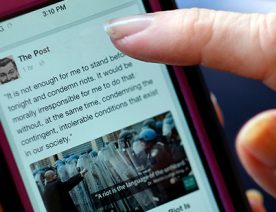
For years, studies have shown Americans’ trust in the news media is steadily declining. At the same time, data show that over the past decade, people have been consuming more news than ever. How are we to explain the apparent paradox?
New research by the Media Insight Project, a collaboration of the American Press Institute and The Associated Press-NORC Center for Public Affairs Research, suggests public attitudes about the news media are more complex and nuanced than many traditional studies indicate, with attitudes varying markedly depending on what media people are asked about.
The findings show that on many fronts, Americans are skeptical of “the news media” in the abstract, but generally trust the news they themselves rely on. And most people mention traditional or mainstream news sources as the ones they turn to.
Americans appear to consider “the news media” a general category that includes both good and bad actors, and their confidence in the media in general is shrinking. But even at a time of growing distrust in the media generally, Americans can find news sources they think are accurate, fair, moral, transparent about mistakes, and trustworthy.
The new research does reveal stark partisan divisions in public attitudes about the press, much as other research has. But these partisan divisions, too, depend on whether people are asked about the media in general or the media they personally use.
It also finds that Americans under age 40, regardless of ideology, trust the news media far less than their elders do. And while these differences become smaller when adults under age 40 are asked about the sources they rely on, they do not entirely disappear.
The survey was conducted March 8 through March 27, 2017, using AmeriSpeak®, the probability-based panel of NORC at the University of Chicago. Interviews were conducted online and over the phone with 2,036 American adults.




